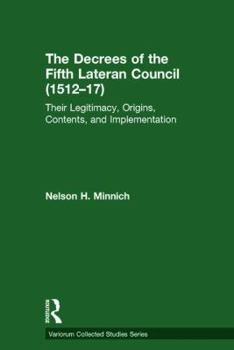The Decrees of the Fifth Lateran Council (1512-17): Their Legitimacy, Origins, Contents, and Implementation
The Fifth Lateran Council (1512-17), whose 500th anniversary is being commemorated, has left a legacy little studied by scholars. The council's status as an ecumenical council was questioned by its opponents and its decrees ignored, resisted, or only slowly implemented. This new collection of articles by Nelson H. Minnich examines: what is an ecumenical council, the reasons Lateran V qualifies as such, the roles the popes played in it, the council as a theater for demonstrating papal power, what was proposed as its agenda, what decrees were issued, and to what extent they were implemented. The decrees that receive special attention are those: affirming the legitimacy of the credit organizations known as montes pietatis that charged management fees, imposing prepublication censorship on printed works, abrogating the Pragmatic Sanction of Bourges (1438), reining in the privileges of mendicant friars, and closing the council while imposing a crusade tithe. These decrees were gradually implemented and Carlo Borromeo incorporated some of the Lateran reform decrees into his conciliar legislation that was taken up by other bishops. Lateran V did leave a lasting legacy and Leo X considered the council one of his great achievements. The volume includes four studies not previously published in English. (CS1060).
Format:Hardcover
Language:English
ISBN:1472484649
ISBN13:9781472484642
Release Date:March 2016
Publisher:Routledge
Length:346 Pages
Customer Reviews
0 rating





